LATEST PODCAST, Ep 97: In Part 1 of this podcast, expert educators Diane Snowball and Keay Cobbin discuss the science of reading. They emphasise that the science of reading is a term used by various educational communities and can have different interpretations. They provide definitions from reputable sources, highlighting that it encompasses multidisciplinary knowledge from educators, linguistics, cognitive psychology, special education, and neuroscience about how children learn to read.
They discuss common misconceptions, such as equating the science of reading with a specific phonics program, and the challenges this can create in education. They emphasise the importance of continually updating knowledge because the science of reading is always evolving.
The podcast also delves into different models of the reading process, including the Simple View of Reading, Scarborough's Reading Rope, and the Active View of Reading. These models are seen as valuable tools for understanding reading but are not a one-size-fits-all solution. The discussion highlights that teachers need strong content knowledge and pedagogical skills to apply these models effectively in the classroom.
Keay and Diane then discuss the importance of providing students with sufficient independent reading and writing time. They stress the need for explicit instruction during this time, ensuring that students understand how to apply what they learn in their own reading and writing.
They reference the National Reading Panel's five major components for successful reading: phonemic awareness, phonics, comprehension, vocabulary, and fluency. They highlight the significance of providing balance in a reading program that integrates systematic phonics instruction with other reading elements. Vocabulary instruction is discussed, with an emphasis on morphology and building vocabulary through reading. The evolving understanding of these components over time is acknowledged.
Overall, the podcast emphasises the importance of staying informed about the evolving science of reading and using this knowledge to inform teaching practices tailored to the needs of individual students.
Stay tuned for Part 2.
Links to resources coming soon!
Enjoy, and let us know thoughts and feedback in our Facebook Group.
Subscribe on Apple Podcasts, Spotify, or your favourite podcast player.
- Simplecast: https://the-teachers-tool-kit-for-literacy.simplecast.com/episodes/part-1-understanding-and-using-the-science-of-reading
- Apple Podcasts: https://podcasts.apple.com/au/podcast/part-1-understanding-and-using-the-science-of-reading/id1536825174?i=1000628980596
- Spotify: https://open.spotify.com/episode/1hS4Oed4SGLU7OiGDZD2GO
Diane Snowball is a prominent educator, based in Melbourne, with 56 years of experience across various education levels. She focuses on improving student literacy through teaching, professional development, and leadership roles. Diane's contributions include international presentations, authoring books and articles and producing educational materials. She served as President of the Australian Literacy Educators Association and has led literacy initiatives in Australia and the US. Diane's work encompasses advising, mentoring, and founding organisations dedicated to literacy education, emphasising teaching practices based on sound research.
Keay Cobbin is the director of Wilcob Education in Melbourne, established in 2010 with Steve Willy. With 28 years of teaching and 24 years of consulting experience, she specialises in literacy and leadership. Keay has designed and delivered various literacy and leadership courses for educational institutions and regions, demonstrating a deep understanding of educational systems, literacy research, and pedagogy. She has also provided professional development for the Department of Education in Tasmania and facilitated workshops in different regions to enhance teaching practices.

